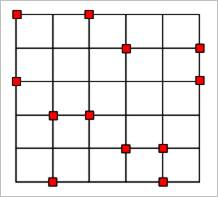21.4.3.11. Level Balanced Descriptive Design
Descriptive sampling is based on a regular selection of the sample values and their random permutation. In general, Descriptive sampling is very close to the discrete Latin Hypercube design, because it is also based on a deterministic selection of sampling points. The proposed descriptive design always guarantees the level balance and strength-I orthogonal characteristics while \(N=k*levels\). From the viewpoint of this descriptive design, the discrete Latin Hypercube design is a special case of \(N=k*1\). Thus, we use the proposed descriptive design for effect analysis and the discrete Latin hypercube design for meta-model. Figure 21.144 shows a descriptive design with \(N=12\), \(k=2\) and \(levels=6\). As you can see, all six levels have two trials, respectively.

Figure 21.144 A Level Balanced Descriptive sample with \(N=6\), \(k=2\), and \(levels=6\)
Reference
Eduardo, S., 1997, “Descriptive Sampling: An Improvement over Latin Hypercube Sampling”, Proceeding of the 1997 Winter Simulation Conference, Andradottir, S., Healy, K.J., Withers, D.H. and Nelson B.L. (eds.)
Iman RL, Helton JC, and Cambpell JE “An approach to sensitivity analysis of computer models, Part I. Introduction, input variable selection and preliminary variable assessment”, Journal of Quality Technology 13:174-183, 1981.